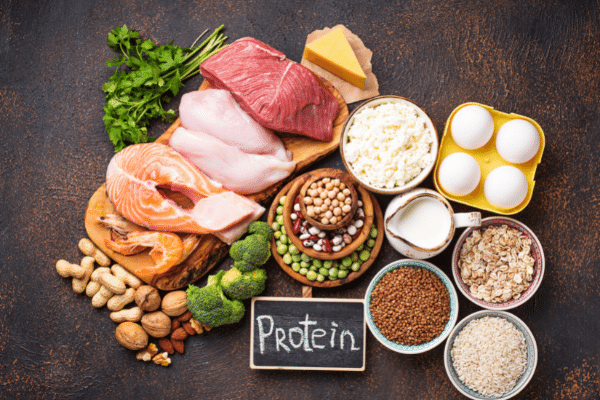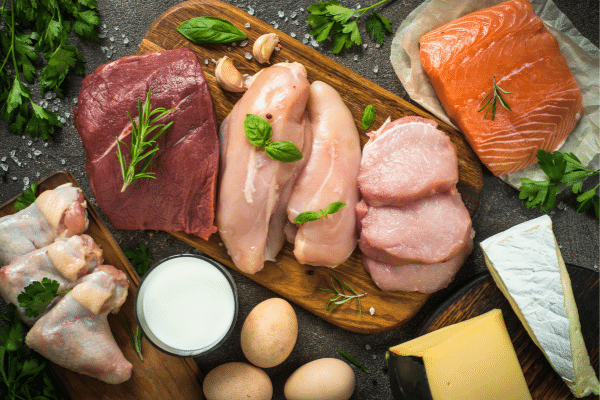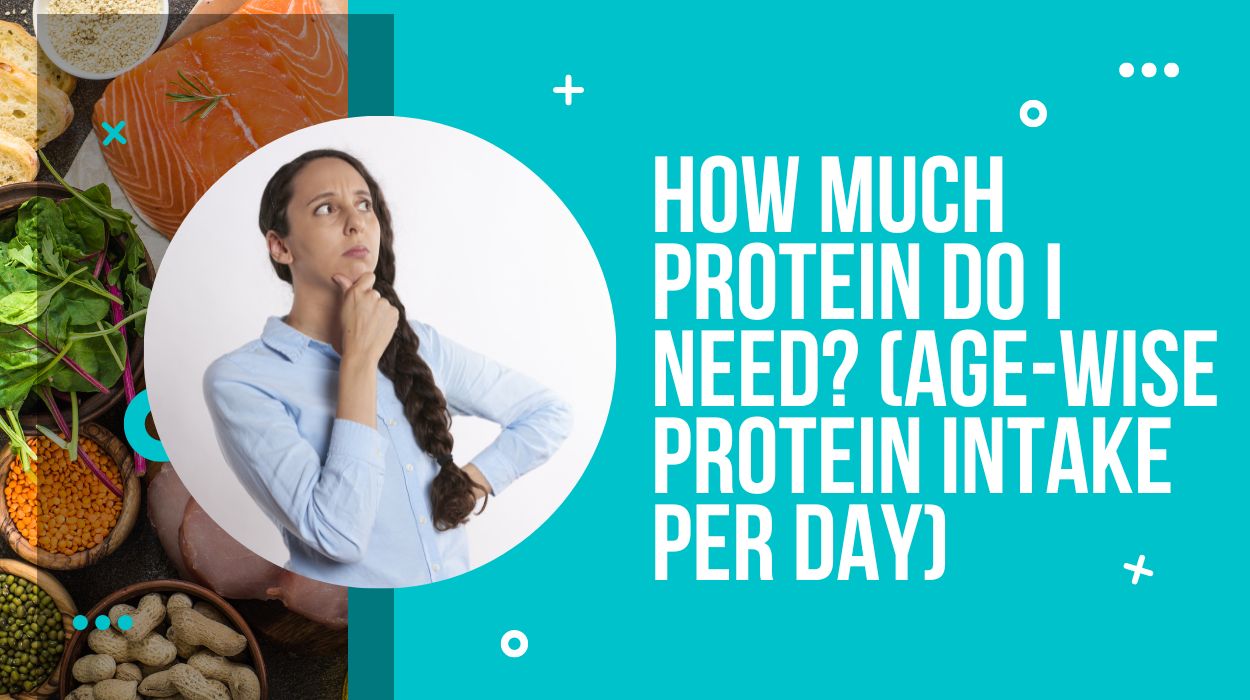Protein is a prime component to maintain the overall health of the human body. It is good that people have become cautious about their health in recent years and have increased their protein intake.
So, how much protein does your body exactly need? Unfortunately, the answer to this question isn’t simple as the protein intake differs from person to person depending on their activity level and age.
Uncertain about your protein requirements? Read the entire article to understand the right amount of protein for your body.
Why Is Protein Essential?

We often keep track of our calorie and sugar intake; however, we should also monitor our protein intake closely. Proteins are essential in the development of organs, skin, muscles, tendons, enzymes, hormones, etc. proteins play a vital role in repairing and maintaining the tissues and framework of the body.
The human body produces many amino acids (long protein chains), but the other Essential amino acids need to be acquired through food. As Protein is considered a ‘macronutrient’, it is required in significant quantities by the human body.
Author’s Note: The human body is incapable of storing Protein. Hence it is vital to meet the daily protein requirements.
Rich Sources Of Protein:

| Food Type | Protein Content (in grams) |
| 1 Cup of Cooked Beans | 16 grams |
| Greek Yogurt | 17 grams |
| 1 Egg | 5–6 grams |
| 100 Grams of Chicken Breast | 32 grams |
| 100 Grams Lentils (Boiled) | 9 grams |
| 100 Grams Cottage Cheese | 11 grams |
| Milk (Per Serving) | 4 grams |
| Fish (Pomfret, Rohu, Katla) | 17–20 grams |
| 100 Grams Tofu | 8 grams |
| Seeds (Chia, Sunflower) | 17–21 grams |
Author’s Note: Other types of cheese with high protein contents include cheddar (3.96), mozzarella (6.29)
The Right Time For Protein Consumption:
The ideal time for protein intake is also as important as the type and the amount of Protein. The human muscles break down as a result of intensive training. If the protein intake isn’t up to the mark, these muscles do not heal. The optimal time of protein ingestion is post-workout as muscles are sensitive and need nutrient intake.
The Journal of Nutrition published research that concluded. The absorption rate of Protein is 25% higher when uniformly distributed over breakfast, lunch, and dinner.
Categories Of People And Their Protein Requirements:
1. An Athlete Or A Physically Active Adult

Protein is also essential to maintain the nitrogen balance in the body. Athletes and adults that are physically active have more protein requirements than the general population. However, protein intake varies depending on body type, weight, age, fitness goal (weight loss, weight gain, or building muscle mass), and training intensity.
On a rough estimation, athletes indulging in endurance training will need 1.2 to 1.5-grams of protein per kilogram of body weight. On the other hand, athletes who go through strength training will need 1.3 to 1.8 grams of protein per kilogram of body weight. Athletes that have reduced their energy intake should consume 2 grams of protein per kilogram of body weight to avoid muscle loss.
A sports nutrition counselor, Nancy Clark, says the protein intake does not differ based on gender. The more active you are during the day, the more efficient your muscles utilize dietary Protein. Wounded warriors or recreational athletes require 1.1 to 1.4 grams of protein per kilogram of body weight.
Protein Sources for Athletes:
- Milk Derivatives
- Whey Protein
- Eggs
- Casein Protein
- Soy Products
- Meat
Author’s Note: If you consider going professional in your sport, your best bet is to get a diet plan crafted by a sports dietitian.
2. Overweight People Trying To Lose Weight

The 2015 edition of clinical nutrition asserted that the ideal protein intake of an obese adult should be 29 grams of protein per kilogram of body weight. Hitting the targeted protein intake every day will support highly in getting rid of the extra weight. Combine Protein with a low-calorie diet and exercise to reduce weight at a relatively faster rate.
Obesity afflicts severe conditions like diabetes, heart disorder, high cholesterol, and high blood sugar levels. Reducing calorie intake helps in alleviating these conditions. High protein food intake will make you feel satisfied with less food consumption.
Proteins require a massive amount of calories to digest. It is imperative to lose some calories to maintain a healthy weight. Swipe processed and refined food for eggs and low-fat cottage cheese.
Author’s Note: Steer clear of fried proteins or those containing saturated fat.
3. Elderly Adults

Per the food and nutrition board, the optimal protein intake in people above 65 is 1 to 1.5 grams per kilogram of body weight. Failing to meet the daily protein demand can cause a lack of muscles response and reduced mobility.
Older adults are prone to acute illnesses; hence, they need a protein-rich diet. Aging bodies lose the ability to process Protein effectively and need more of it to build strength, bone health, and muscle mass. Even Protein distribution throughout the day is especially beneficial for elderly adults as their body struggles to synthesize muscle protein.
Meat, eggs, and dairy are considered ‘complete proteins’ containing 9 essential amino acids. These amino acids are vital in preventing sarcopenia, the most common disorder associated with Ageing. Read the article pointing out promising evidence published on the National library of medicine website.
Author’s Note: A survey estimated that 38% of grown-up males and 41% of grown-up females Do not reach the threshold of their required protein intake.
4. Women

It is unacceptable that women neglect their health. They should meet their nutritional requirements daily to avoid any health disorders. The requirement of proteins depends on overall health, activity level, etc. a rough estimation can be done by multiplying the weight in pounds by 0.335 to determine the estimated protein requirement suitable for the body weight.
Women looking to make lifestyle changes by maintaining weight should gradually boost their protein intake with light exercise. High protein intake also helps in keeping cardiac illness at bay. The bone density and strength decline is prevalent in women. However, sufficient protein intake will keep your bones, tendons, cartilage, and muscle in impeccable condition. 30% of the mass and 50% of bone volume is made out of Protein.
Protein requirements during pregnancy:
Protein improves the growth of the infant and maximizes breast milk production. Pregnant women require twice the amount of Protein as non-pregnant women. It is imperative to consume 65 to 100 grams of protein per day.
5. Children In The Growth Stage

Protein requirements change with age and fluctuations in body weight. The USDA gives guidelines on the appropriate protein intake in children below 14. On the other hand, girls and boys above the age of 14 require 45 to 52 grams of protein per day.
| Age | Grams/Day | Grams/Kilogram |
| 1 – 3 years | 13 grams/ day | 1.05 grams |
| 4 – 8 years | 19 grams/ day | 0.95 grams |
| 9 – 13 years | 34 grams / day | 0.95 grams |
Children require higher doses of Protein to remain energized. Low hemoglobin levels result in fatigue. Hence it is necessary to keep your protein intake in check as they aid in the production of hemoglobin. Children’s immune system needs to be robust as a weak immune system results in the child falling ill frequently. Eating more Protein keeps the kids full for longer and reduces snacking on unhealthy food.
Per Day Protein Requirements Of People With Different Age Groups:
| Age Group | Protein Requirements (Per Day) |
| Babies | 10 grams |
| School going kids | 20 – 35 grams |
| Teenage girls | 46 grams |
| Teenage boys | 52 grams |
| Adult men | 56 grams |
| Adult women | 46 grams |
| Pregnant and breastfeeding women | 71 – 77 grams |
What Happens If Your Body Lacks Protein?
Lack of Protein has catastrophic effects on the body. The bones, muscles, and organs should work like a well-oiled machine. And Protein is required by the body to function efficiently.
1. Mood Changes
The human brain relies on neurotransmitters to pass information from cell to cell. Most of these neurotransmitters are formed by amino acids (long chains of proteins). Therefore if your body has protein deficiency, it cannot produce the targeted amount of neurotransmitters. Protein deficit creates an imbalance in brain functioning, resulting in low serotonin and dopamine levels. An insufficient amount of these neurotransmitters leads to depression, stress, and aggression.
2. Slow Healing from Injuries
Proteins are present in the skin and connective tissues. They are also essential in forming blood clots. People having deficiencies in Protein heal slower from injuries.
3. Skin, Hair, and Nail Issues
Our hair, skin, and nails consist of proteins like keratin and collagen. Lack of Protein results in hair thinning, hair fall, dry skin, and weak nails.
4. Kwashiorkor (Nutritional Disorder)
Kwashiorkor is a disorder in which a person gets malnourished due to a lack of Protein. If left untreated, especially in children may block physical and mental development. It may also leave the kid permanently impaired.
FAQs
1. Can children below the age of 14 take protein supplements?
The meals account for all the daily protein requirements in kids. It is needless to give protein supplements to children as they might do more harm than good. Unnecessary protein supplements intake may lead to excess sugar, calories, and weight.
2. Are people advised to stick to a low protein diet?
Besides people with impaired kidneys and liver functioning, people with disorders that prevent protein metabolism must maintain a low protein diet. A low protein diet is between 20 to 40 grams per day.
3. What happens if you consume ample Protein but not enough calories?
There should be a balance of all the elements in a diet. If you do not fulfill your body’s calorie demand, you are looking at significant weight loss and not in a healthy way. Also, you won’t be able to increase or maintain muscle mass. The body will eventually burn protein, letting it go to waste.
Conclusion:
By now, you can concur with me when I say Protein is the jack of all trades. The right amount of Protein will bring positive changes in your day-to-day life and increase your life expectancy significantly.
We learned about the protein requirements of athletes, elderly adults, women, and children. Besides understanding the importance of Protein, we also came across some foods with high protein content.
Let us know how you fulfill your daily protein goal in the comments section below.


